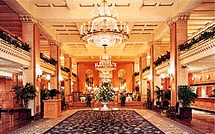
Company/Organization Profiles | Local Industry
Protecting Our History
Written by Nicole Sawyer | Posted by: Anonymous
Images of the moon landing or Martin Luther King’s speeches have become such visual icons in our culture that we rarely think about where this footage comes from or consider the work involved in making it available to media artists. Although we often take for granted the work that archivists do, they are preserving our history and culture, from monumental images like these to clips of the common man going about his everyday life. The Association of Moving Image Archivists (AMIA) dedicates itself to advancing the field of audio-visual archiving. Its annual conference, which will take place at the Boston Park Plaza Hotel and Tower from November 18-23, provides a forum for the people who work in this field to discuss the issues relevant to their largely under-appreciated work.
AMIA traces its beginnings to the late ‘60s, when representatives from various archives began to hold regular meetings under the banner of the Film and Television Archives Advisory Committee (FT/AAC). Over the years the organization expanded to include members from a broad range of audio-visual mediums and from over 100 institutions and 30 countries. They changed their name to AMIA in 1990. AMIA undertakes a number of activities designed to promote awareness and interest in moving image preservation and increase access and use of the archival material. In addition to its annual conference, AMIA also publishes a semi-annual journal and a quarterly newsletter; develops and conducts workshops throughout the year to help train archivists; and establishes and administers scholarship and internship programs for people interested in studies in the archival field.
Lisa Carter, a member of the AMIA board of directors and Chair of this year’s Conference Committee, was introduced to the organization while earning her Master’s degree in Library Science. "My program did not really have much support for someone who wanted to take care of unique audio-visual media and provide access to moving image footage," Carter recalls. To help her navigate her way in this relatively obscure field, a fellow student directed her to the AMIA-L listserv, which facilitates communication among professionals about all aspects of the archiving of moving image materials. "Through the professional dialogue on that listserv," says Carter, "I knew I had finally found a community that shared my interests." After attending the 1995 conference in Toronto and experiencing "the openness of the group, the variety and intensity of the sessions and the great reception at the Hockey Hall of Fame Museum," Carter began her long-term, active involvement with the organization.
Conference attendance has more than tripled in the last 10 years due in part to its exciting, informative, friendly and supportive atmosphere and AMIA’s commitment to addressing the interests of all of its members. Conferences generally include workshops, exhibits, interest group and committee meetings, receptions, and the popular Archival Screening Night. These events cover everything from "metadata, 28mm film, materials that support moving images such as costumes, posters and props, academic films, civil rights media, legal issues, international archives, Internet access, working with labs, digital audio, corporate collections and even sexually explicit entertainment," Carter says. "And I think this diversity is the key to the AMIA Conference. Our conference is the event where all people interested in moving images can meet and share their expertise, which broadens all of our experience within our profession."
Just as important as diversity is to the success of the conference is the enthusiasm, levity, and mutual interest and support of the AMIA community. "The conferences are always very collegial," Carter notes. "This is the one time of year that we all get to see each other and catch up on personal news as well as business. We try to mix the intellectual and professional tone of the sessions with some great parties in the evening."
Although the conferences have been so successful and the response from attendees has been overwhelmingly positive, AMIA’s dedication to all forms of moving image materials often makes organizing the conference a complicated task. "We deal with all moving image and related material and to show it or talk about it, we need to have equipment for the proliferation of moving image formats that exist out there." This requirement means that AMIA must often borrow equipment from other organizations, shipping equipment around the country, and find a venue that can handle the variety of formats and still provide adequate seating.
These practical concerns are some of the reasons that AMIA has chosen to return to Boston for its annual conference. Boston was the site of the 1994 conference, and Carter says that the long-time members of the association have fond memories of that event. AMIA also has a large contingent of members in the Boston area from such institutions as WGBH, JFK Library, Harvard Film Archive, and the National Center for Jewish Film. Still, Boston’s technological and spatial capabilities had a great deal to do with the decision. As a nod to community that is providing a venue for the conference, AMIA is including among its varied program continuous screenings of materials from its Regional Archives and independent digital shorts from the Boston area, as well as a screening of "The Electronic Canvas," a documentary focused on television and media artists in 1960’s Boston.
Though AMIA shows a great dedication to its members and builds close ties among its members, the organization never forgets that the archival field functions to preserve and provide access to moving images for as many people as possible. The annual conference is open to all regardless of membership and the listserv welcomes appropriate posting from non-members. Yet as AMIA grows it will continue to work even for the vast majority of viewers that will never recognize or appreciate their efforts, rather quietly and very happily collecting, protecting, and viewing the materials that help document and express our history and culture.
The complete program of the 2002 AMIA Conference is available on their Website, www.amianet.org. Visit the site or call 310-550-1300 for more information about the conference and other AMIA activities.











